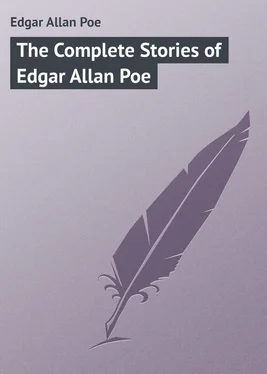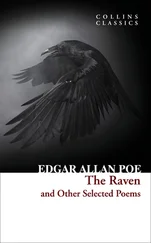In consideration of certain mental endowments, which it would be unnecessary to specify, and in farther consideration of the sum of one thousand Louis d’or, I, being aged one year and one month, do, hereby, from this date, make over, to the bearer of this bond, all my right, title, and appurtenance in the shadow called ‘my soul.’
Done at Paris, this – day of —, in the year of our Lord —, FRANCOIS MARIE AROUET.
“A clever fellow that,” resumed the stranger, “but he was wrong about the shadow – the soul a shadow! – no such nonsense, Signor Pedro. – Only think of a fricaseed shadow!”
“Only think of a fricaseed s – h – a – d – o – w!” echoed our hero, whose faculties were becoming gloriously illuminated, “now, damme,” continued he, “Mr. – humph! – damme! (hiccup) if I would have been such a nincompoop. My soul, Mr. – humph! – yes, sir, my soul.”
“Your soul, Signor Pedro?”
“Yes, sir, my soul is – is – is – no shadow, damme!”
“I should be sorry to suppose, Signor Pedro —”
“Yes, sir, my soul is peculiarly calculated for – for – a stew, damme!”
“Ha!”
“A ragout —”
“Eh?”
“A fricasee —”
“Ah!”
“Or (hiccup) a cotelette – and I’ll let you have it a bargain.”
“Couldn’t think of such a thing,” said the stranger, calmly, at the same time arising from his seat.
Pedro stared.
“Am supplied at present —”
“Eh?”
“Have no cash on hand —”
“What?”
“Very ungentlemanly in me —”
“Humph!”
“To take advantage of —”
“Sir!”
“Your peculiar situation.”
Here the stranger bowed and withdrew, in what manner our philosopher could not exactly ascertain; but, in a well concerted effort to discharge a bottle at the scoundrel, the slender chain was severed that hung from the ceiling, and the metaphysician prostrated by the downfall of the lamp.
THE END
Loss of Breath (1850)
A Tale Neither In Or Out Of “Blackwood”
O Breathe not, etc.
Moore’s Melodies
THE MOST notorious ill-fortune must in the end yield to the untiring courage of philosophy – as the most stubborn city to the ceaseless vigilance of an enemy. Shalmanezer, as we have it in holy writings, lay three years before Samaria; yet it fell. Sardanapalus – see Diodorus – maintained himself seven in Nineveh; but to no purpose. Troy expired at the close of the second lustrum; and Azoth, as Aristaeus declares upon his honour as a gentleman, opened at last her gates to Psammetichus, after having barred them for the fifth part of a century….
“Thou wretch! – thou vixen! – thou shrew!” said I to my wife on the morning after our wedding; “thou witch! – thou hag! – thou whippersnapper – thou sink of iniquity! – thou fiery-faced quintessence of all that is abominable! – thou – thou-” here standing upon tiptoe, seizing her by the throat, and placing my mouth close to her ear, I was preparing to launch forth a new and more decided epithet of opprobrium, which should not fail, if ejaculated, to convince her of her insignificance, when to my extreme horror and astonishment I discovered that I had lost my breath.
The phrases “I am out of breath,” “I have lost my breath,” etc., are often enough repeated in common conversation; but it had never occurred to me that the terrible accident of which I speak could bona fide and actually happen! Imagine – that is if you have a fanciful turn – imagine, I say, my wonder – my consternation – my despair!
There is a good genius, however, which has never entirely deserted me. In my most ungovernable moods I still retain a sense of propriety, et le chemin des passions me conduit – as Lord Edouard in the “Julie” says it did him – a la philosophie veritable.
Although I could not at first precisely ascertain to what degree the occurence had affected me, I determined at all events to conceal the matter from my wife, until further experience should discover to me the extent of this my unheard of calamity. Altering my countenance, therefore, in a moment, from its bepuffed and distorted appearance, to an expression of arch and coquettish benignity, I gave my lady a pat on the one cheek, and a kiss on the other, and without saying one syllable (Furies! I could not), left her astonished at my drollery, as I pirouetted out of the room in a Pas de Zephyr.
Behold me then safely ensconced in my private boudoir, a fearful instance of the ill consequences attending upon irascibility – alive, with the qualifications of the dead – dead, with the propensities of the living – an anomaly on the face of the earth – being very calm, yet breathless.
Yes! breathless. I am serious in asserting that my breath was entirely gone. I could not have stirred with it a feather if my life had been at issue, or sullied even the delicacy of a mirror. Hard fate! – yet there was some alleviation to the first overwhelming paroxysm of my sorrow. I found, upon trial, that the powers of utterance which, upon my inability to proceed in the conversation with my wife, I then concluded to be totally destroyed, were in fact only partially impeded, and I discovered that had I, at that interesting crisis, dropped my voice to a singularly deep guttural, I might still have continued to her the communication of my sentiments; this pitch of voice (the guttural) depending, I find, not upon the current of the breath, but upon a certain spasmodic action of the muscles of the throat.
Throwing myself upon a chair, I remained for some time absorbed in meditation. My reflections, be sure, were of no consolatory kind. A thousand vague and lachrymatory fancies took possesion of my soul-and even the idea of suicide flitted across my brain; but it is a trait in the perversity of human nature to reject the obvious and the ready, for the far-distant and equivocal. Thus I shuddered at self-murder as the most decided of atrocities while the tabby cat purred strenuously upon the rug, and the very water dog wheezed assiduously under the table, each taking to itself much merit for the strength of its lungs, and all obviously done in derision of my own pulmonary incapacity.
Oppressed with a tumult of vague hopes and fears, I at length heard the footsteps of my wife descending the staircase. Being now assured of her absence, I returned with a palpitating heart to the scene of my disaster.
Carefully locking the door on the inside, I commenced a vigorous search. It was possible, I thought, that, concealed in some obscure corner, or lurking in some closet or drawer, might be found the lost object of my inquiry. It might have a vapory – it might even have a tangible form. Most philosophers, upon many points of philosophy, are still very unphilosophical. William Godwin, however, says in his “Mandeville,” that “invisible things are the only realities,” and this, all will allow, is a case in point. I would have the judicious reader pause before accusing such asseverations of an undue quantum of absurdity. Anaxagoras, it will be remembered, maintained that snow is black, and this I have since found to be the case.
Long and earnestly did I continue the investigation: but the contemptible reward of my industry and perseverance proved to be only a set of false teeth, two pair of hips, an eye, and a bundle of billets-doux from Mr. Windenough to my wife. I might as well here observe that this confirmation of my lady’s partiality for Mr. W. occasioned me little uneasiness. That Mrs. Lackobreath should admire anything so dissimilar to myself was a natural and necessary evil. I am, it is well known, of a robust and corpulent appearance, and at the same time somewhat diminutive in stature. What wonder, then, that the lath-like tenuity of my acquaintance, and his altitude, which has grown into a proverb, should have met with all due estimation in the eyes of Mrs. Lackobreath. But to return.
Читать дальше












